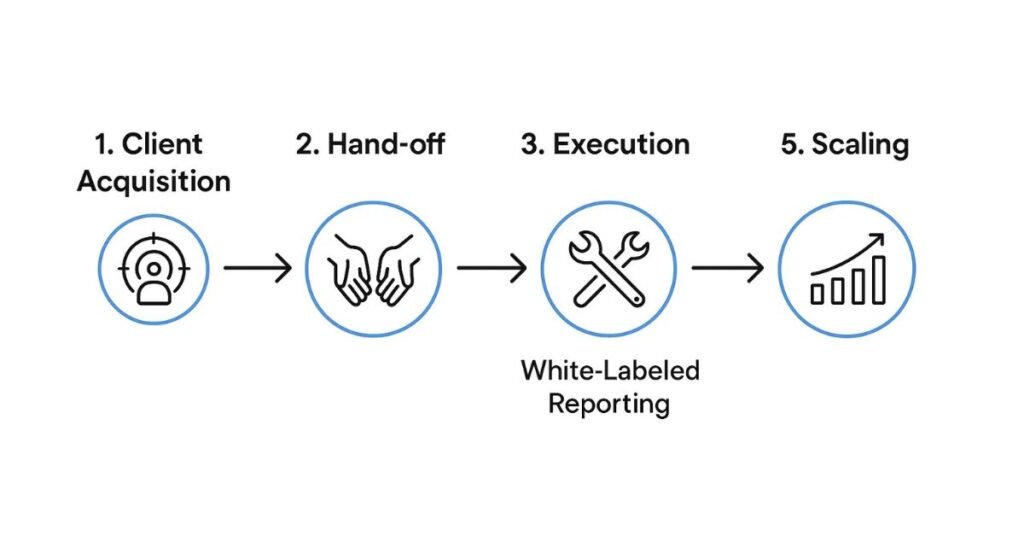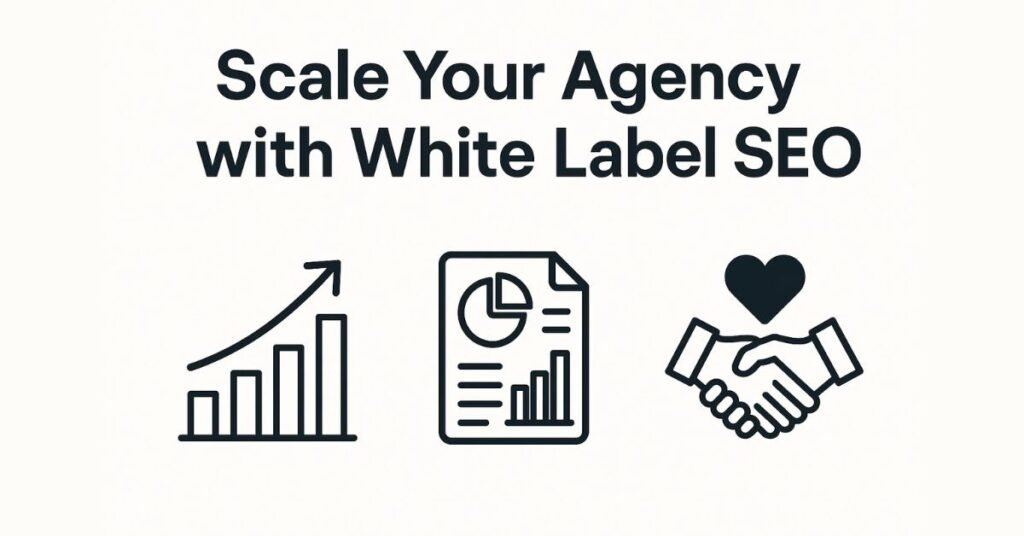White label SEO services let agencies resell professional SEO work under their own brand: an external provider handles strategy, optimization, content, and reporting while your agency presents the results as its own. This model enables agencies to offer full-service SEO without building an in-house team.
Key Takeaways
- White label SEO lets agencies deliver SEO under their own brand without hiring specialists.
- Services commonly include technical SEO, on-page optimization, content, link building, and reporting.
- The model saves time and cost, improves scalability, and preserves client relationships.
- Selecting the right white label partner requires quality control, clear SLAs, and transparent reporting.
- SEO Specialist Pakistan provides white-label-ready services and branded reporting for agencies.
Introduction — Why this model matters
White label SEO is not a niche tactic; it’s a practical business model that answers two problems at once: client demand for SEO services and the high cost of building internal SEO expertise. Rather than asking agencies to become experts in every digital discipline, white label lets them focus on client relationships and strategy while a trusted partner executes the technical work. Below, I explain how this works, what you should expect from a provider, who benefits most, and how to choose a partner — step by step.
What exactly is white label SEO?
White label SEO is a partnership-based service. An agency (the reseller) contracts with an SEO provider (the deliverer). The provider performs SEO tasks — audits, optimizations, content, link building, tracking — and delivers results and reports that are rebranded for the reseller’s clients. The client sees the reseller as the source of the work, while the technical execution stays behind the scenes.
Why this matters: the agency retains the client relationship and brand value; the provider supplies executional capacity and expertise. For the client, the experience is seamless. For the agency, it’s scalable growth without heavy hiring or software costs.

How white label SEO typically works (step-by-step)
Step 1: Client acquisition and scope alignment
An agency sells SEO as a service or package. At this point the agency maps client goals (traffic, leads, local visibility) and a scope (monthly hours, deliverables, KPIs).
Step 2: Hand-off to the white label partner
The agency shares access, briefs, and expectations with the white label provider. A clear brief and onboarding reduce back-and-forth later.
Step 3: Strategy and execution by the provider
The provider runs technical audits, keyword strategy, on-page fixes, content production, and outreach/link campaigns according to the agreed plan.
Step 4: White-labeled reporting & feedback loop
The provider delivers results in a branded dashboard or PDF report. The agency reviews and presents the work to the client, often adding strategy, consulting, and relationship management.
Step 5: Iteration and scaling
Based on results, the agency and provider refine priorities (e.g., push local SEO, product page optimization, or content hubs) and scale resources as necessary.
These steps make it easy to visualize responsibilities and control quality across the whole engagement.
What’s included in a professional white label SEO package — and why each piece matters
Below I explain common deliverables and why they’re essential. Each item is a building block — together they produce sustained search visibility.
Technical SEO
On-page optimization
Why: search engines need to crawl, index, and render your site efficiently. Technical SEO fixes (site speed, structured data, crawl errors, mobile rendering) remove barriers that prevent content from ranking.
Why: every public page is an opportunity. Title tags, meta descriptions, H1s, internal linking, and content structure tell search engines and users what the page is about and how to use it.
Content strategy & creation
Why: content drives discovery. Targeted blogs, guides, and optimized landing pages capture search intent, attract links, and convert visitors into leads.
Local SEO (when relevant)
Why: for brick-and-mortar or service-area businesses, appearing in map packs and “near me” results is direct revenue. This includes Google Business Profile optimization, local citations, and review management.
Link building & digital PR
Why: high-quality backlinks remain a core ranking signal. Outreach and PR earn references from authoritative sites, improving domain trust and rankings.
Analytics, tracking & white-labeled reporting
Why: SEO is measurable. Branded, clear reports let you show progress, attribute leads, and refine strategy — without exposing who actually executed the work.
Each of these components contributes to ranking, traffic, and conversions. A trustworthy white label provider will combine them into a cohesive strategy.
Who should use white label SEO?
White label SEO is best for organizations that want to offer SEO but lack the internal capacity to deliver it well. Typical users include:
- Digital marketing agencies that want to add SEO without hiring specialists.
- Web design and development firms that want recurring revenue by bundling SEO with website builds.
- Freelancers and consultants who need technical execution to fulfill client contracts.
- SMBs and startups that require quick access to expertise but cannot invest in a full team.
The common thread: these organizations want to own the client relationship while delegating execution to experts.
Benefits for agencies and their clients — connected outcomes
When an agency resells white label SEO effectively, three positive outcomes align:
- Faster go-to-market: The agency can add SEO packages immediately, which accelerates revenue generation.
- Professional execution: Providers bring tested processes, tools, and specialists, improving the likelihood of measurable results.
- Client trust retained: Because reports are white-labeled, clients see the agency as the full-service supplier, increasing client retention and perceived value.
For clients, benefits manifest as improved rankings, more qualified traffic, and better conversion metrics — the outcomes agencies promise and should deliver.
3 Common pitfalls and how to avoid them
White label SEO is powerful but not automatic. Avoid these traps:
Pitfall: Poor quality or one-size-fits-all execution
Fix: Vet providers for case studies, domain expertise, and tailored strategies. Ask for sample plans, not generic templates.
Pitfall: Bad communication and hidden SLAs
Fix: Set clear service-level agreements (turnaround times, review cycles, deliverables) and maintain an internal process for client updates.
Pitfall: Lack of transparency in reporting
Fix: Demand clear, branded reports that include actions taken, outcomes, and next steps. Ensure clients can trace value back to specific efforts.
If you plan for these issues up front, white label SEO becomes a reliable extension of your team.
How to choose the right white label SEO partner
Look for these signals:
- Proven results: case studies or anonymized client examples showing traffic and conversion growth.
- Process clarity: a documented workflow from audit to reporting.
- Flexible branding: white-labeled dashboards and reports that use your logo.
- Communication: a named account manager and agreed meeting cadence.
- Ethical link-building: no spammy tactics that risk penalties.
A good partner acts like an invisible extension of your agency and helps you scale predictably.
Do You Know? Agencies that add SEO through white labeling often increase average revenue per client because they can upsell ongoing optimization and content services without expanding internal staff.

Dedicated partner section — SEO Specialist Pakistan (how we help)
SEO Specialist Pakistan acts as a white-label SEO partner for agencies, consultants, and design firms who want to provide search marketing but keep the client relationship. We handle the full technical and creative stack: audits, on-page SEO, content creation, link acquisition, local optimization, and white-labeled reporting. Our model is simple: you own the client; we deliver the results.
What we provide to partners:
- Branded deliverables and dashboards
- Flexible packages tailored to your client types
- A single point of contact for smooth project management
- Regular, transparent reporting that you can present directly to clients
Ready to scale your agency with white label SEO?
Example: An agency added white label SEO to its services and offered a combined website + SEO package to five new clients. By outsourcing execution, the agency onboarded the fiveclients within two months and retained 90% after the first quarter — increasing monthly recurring revenue without hiring additional staff.
This illustrates how the model converts potential capacity limits into sustainable growth.
Final Thoughts
White label SEO is a strategic lever: when executed well, it gives agencies the ability to scale service offerings and increase client value without the cost and time of building internal capability. The key is choosing a partner that delivers consistent quality, transparent reporting, and white-labeled presentation so you keep business ownership and client trust.
If you want a white-label SEO partner that integrates with your agency workflow and delivers branded results
rReach out to SEO Specialist Pakistan today.FAQs
Yes, it’s a standard business model. Ethical providers use white-hat SEO practices and keep your brand front and center.
Not if you don’t tell them. White label providers supply branded reports and can operate under NDAs.
Pricing varies by scope: simple monthly packages start lower, while full-service white label solutions that include content and link building cost more. You set resale pricing to manage margins.
Yes. Start with an audit or a one-month pilot to evaluate communication, quality, and results.
SEO takes time. Initial technical fixes and quick wins can show effects in weeks, but meaningful gains typically appear in 3–6 months.


